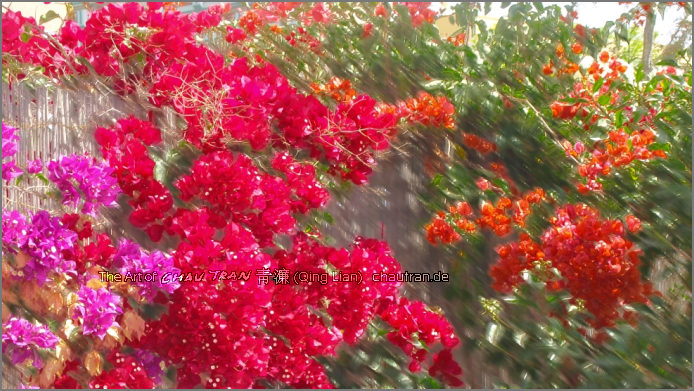The paperflowertree

A flowertree on which the flowers are called "纸花 (zhi hua)" in chinese and "Hoa Giấy / Paperflower" in vietnamese. Our family had a similar flowertree in red on the patio in front of our house at the river in the
suburbs of Saigon. They bloom all year long in a glowing red colour.
After the communist North Vietnam had invaded South Vietnam in the year 1975 and declared Vietnam as unified, the new government sympathized with the Soviet-Union and refused to collaborate with reformed China.
As a punishment for the ungrateful former war-ally against the US, China marched over the border of both countries, but drew back after a short time, just to warn Vietnam. ( During Vietnam-war there was a famine, but the
Chinese tightened their belts anyway and supported the communist Vietnam by continously delivering food and wepaons).
We, as Chinese, lived in the former capitalistic South Vietnam. Although all capital
was confiscated by the new regime, we were reeducated and . . . and . . . and anyway we were suspected to work as spies for the communist China. Many, many Chinese in South Vietnam and also in North Vietnam were arrested and one never again
heard something from them.
Our family lived with this threat and a constant fear. My two elder and my two younger brothers fled from Vietnam in the year 1978. I didn't want to go with them, because I worried about my parents and the younger siblings.
But now I had to make the most fatal decision of my whole life. My father said over and over again: "You have to go, one can perceive, that you are being observed. Don't tell your siblings about it." Certainly my siblings
mustn't know about it. It was bad! I couldn't abandon them! . . . . . .
Two days later on my way home I ferried across the river. When the ferry boat was in the middle of the river, the ferryman looked to the left, then to the right and then deep into my eyes. He repeated that one more time.
I could sense how under his old and ragged shirt and trousers his blood was circulating through his skinny and trembling body. After 1975 everybody became thin and skinny, only the winners of the war gained more for life.
The ferryman once more tried to look deep into my eyes, this time his view reached deep into my soul. Suddenly a thought crossed my mind like a light beam. Now I understood what he wanted to tell me silently: "Why are you
still here . . . . . You should have gone earlier." I looked into his face and saw tears rolling from his eyes. Arriving at the riverbank I disembarked, but before I hid some money, that I still had in my pocket, under a
wooden seat. With an expression on his face he thanked me and I left the ferryboat.
I knew that ferryman for decades since my childhood, before 1975 we always had something to talk about and often laughed. After 1975 he was like dumb and deaf, nobody got a single word from his mouth.
In may 1979 I started my escape. Later I often thought about, whether the ferryman still lived or which bad fate he had to suffer with.
One thing I know for sure, he taught me to keep silent after 1975. He was then able to refuse answering questions from "certain people".
Our house was confiscated later, but is the paperflowertree still alive?
- in the year 2015 - Chau Tran (Qing Lian)
(See also Documentation/2000/Journey/Greece)
|


